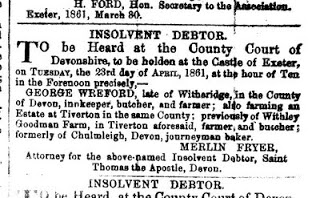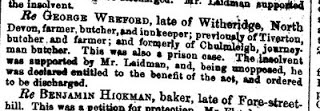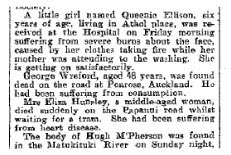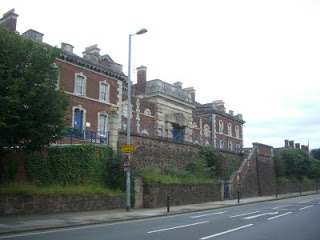Category: NAMES
Member DISconnect
When I log on to ancestry.co.uk nowadays, it shows me ‘Recent Member Connect Activity’. Amongst other things, this means I’m notified when people attach records to their trees that I have also attached to mine. I think that’s actually quite a cool feature. I can now connect with people who are more likely to be family members .
Wreford Death Notice 1902
On the day of his death (21 June 1902), the event was published almost identically in four newspapers of the time.
Mr. George Wreford, aged 48, was found dead on the road at Penrose this afternoon. He had been suffering from consumption (Evening Post [NZ], 21 June 1902).
The detail found in newspapers can be great and even this brief mention holds valuable information for the family historian – date of death, approximate year of birth, place of death and cause of death.
The Auckland City Libraries have this burial in the Otahuhu with the note, “buried 21 June 1902 Baptist, labourer, lived Onehunga, died Penrose 21 June 1902, 48 years, born Devonshire”
When I first came across this reference, I wasn’t sure if this George WREFORD was part of my bunch. I knew it wasn’t ‘my’ George WREFORD because of the age and dates given but I’m now quite sure this is my George’s son who was born 1853 in Tiverton, Devonshire.
My reasoning:
- George and Harriet (and family) settled in Auckland and eventually died there
- Born 25 April 1853 means he would indeed be 48 in June 1902
- The cemetery records mention the deceased’s birth place as Devonshire
I only have one source to contradict this but I believe this ‘evidence’ combined outweighs that source (to be discussed in another post).
I have decided to post the details of the other people published in the two casualty sections referenced here. Not only because I find the detail given in old papers fascinating but in the hope that it may help any descendants who stumble across this blog in the future.
Evening Post, 21 June 1902
ACCIDENTS and FATALITIES
AUCKLAND, 20th June Mr. R. Hellaby, of the well-known firm of R. and W.Hellaby, Limited, wholesale butchers, died suddenly today.
CHRISTCHURCH, This Day. An elderly man named John Roberts was found dead in his chair at a boardinghouse last evening.
Otago Witness, 25 June 1902
CASUALTIES.
Mr Hesson, of Alexandra, had the misfortune to lose a valuable horse and trap on Thursday last. While driving near the bridge at Alexandra the horses became unmanageable, and backed over ih& bank. Mr Hesson, fortunately, managed to unhitch the leader, which was saved. The other horse and trap went into the river, and were never seen again.
A young man named Daniel Berry dislocated his shoulder on Wednesday while loading a lorry in Cumberland street. He was treated at the Hospital, and afterwards was taken home.
The Western Star report that Horace Church (53), a rabbiter living at Wild Bush, is supposed to have been drowned in the Pourakino or Aparima Estuary on Sunday. He left home at 3 p.m. to go to Riverton by boat, his intention baing to attend church in the evening. Since then he has not been seen, while the boat was found on the flats, whither it had drifted. The missing man was subject to fits, and the supposition is that he may havo been seized with one and fallen into the river. Of course he may have gone somewhere, and the boat may have broken adrift. The missing man has a wife and three children.
On Saturday, 14th inst., a visitor from Kaipara, named Grey, was drowned while taking a bath at Kamo Springs, near Wliangarei. Deceased was recovering from an attack of pleurisy and congestion of the lungs, and was in a weak state. Deceased was secretary of the Kaipara Agricultural Soeiety.
A little girl named Queenie Ellison, six years of age, living in Athol place, was received at the Hospital on Friday morning suffering from severe burns about the face, caused by her clothes taking fire while her mother was attending to the washing. She is getting on satisfactorily.
George Wreford, aged 48 years, was found dead on the road at Penrose, Auckland. He had been suffering from consumption.
Mrs Eliza Hunsley, a middle-aged woman, died suddenly on the Papanui road whilst waiting for a tram. She had been suffering from heart disease.
The body of Hugh McPherson was found in the Matukituki River on Sunday night, 35th. McPherson, who was a runholder, was last seen driving a dray and two horses along the road, which follows the river bank. The dray was found on Monday night upside down, and covering the body of deceased. Death was apparently due to an accident.
Annie Griffiths, a widow, aged 65 years, was found dead in her dwelling in Wellington on Wednesday. The cause of death was failure of the heart, accelerated by exposure and alcoholism.
Thomas Dryden, supposed to be from Dunedin, who attempted to commit suicide at Invercargill on Sunday, died on Tuesday evening, 17th. from the injuries inflicted.
A very serious and painful accident befell William Bishop the engineer of the Champion dredge at Beaumont on Friday. Bishop was oiling the screen bearings, and while in a stooping position his coat was caught by the machinery. His cries at once attracted attention, but before the engine could be stopped his arm. together with all the large muscles and adhering flesh of his neck, breast, and shoulders, was torn away from his body. Dr Nowell was telephoned for, and he informs the Tuapeka Times that tliere is little hope of the unfortunate man’s recovery.
Later news says: — Bishop died on Sunday. Bishop was oiling the screen bearings, and while in a stooping position his coat was caught in the machinery. His cries at once attracted attention, but before the engine could be stopped his arm. together with all the large muscles and adhering flesh of his neck, breast, and shoulders was torn away from the body. Dr Newell did everything possible for the unfortunate man, but from the first his case was considered hopeless.
Frederick Irwin, master of the scow Hawk, was very badly crushed between two logs, and died at Auckland on Saturday.
John Roberts, an elderly man, was found dead in his chair at a boarding-house in Christchurch on Friday evening.
Wimberley, secretary of the Hot Lakes Steam Navigation Company, was found drowned in Rotorua Lake on Sunday morning.
KILLED ON THE ANDERSON’S BAY ROAD.
A lad, 14 years of age, named James Bruton, whose parents reside at St. Kilda, met with so serious an accident on the Anderson’s Bay road on Saturday afternoon that he died from his injuries about two hours afterwards at the Hospital. He was in the employ of Mr Thomas Lunn, farmer, of Anderson’s Bay, aud was left in charge of a horse and trap, used for carting vegetables, outside the Bay View Hotel, Mr Lunn in the meantime going round to the back of the hotel with vegetables. The boy was told to take the horse to a drinking-trough in front of the hotel, to give the animal a drink, and it would seem that the animal took fright at something, and bolted in the direction of town. Mr Lunn was informed of the occurrence, and on going along the Anderson’s Bay road a short distance he found the lad lying on the road, apparently badly injured. An express happened to be passing at the time, and in this Bruton was taken to tbe Hospital, where he expired ehortly after admission, the immediate cause of death being a fracture of the base of the skull. The only eye-witness of the accident was Mr Thomas Smith, butcher, of South Dunedin, who states that he saw tbe boy Bruton standing on the off-side of the horse and trap, on the road, in front of the Bay View Hotel, about I o’clock. The horse started off in tho direction of town, and then turned. As it was turning, Bruton attempted to get on to the step, and in doing so he slipped and got hold of the shaft. He held on for some time, till the horse broke into a gallop, when he lost his hold, and fell between the wheels, one of which struck him on the head.
Black Sheep Sunday

Tucked away in the Hobart Town Gazette of 1844 were 2 references for each of my beloved convicts.Elizabeth Allen, Margaret, to Zachary Pocock, Hobart:
Elizabeth Allen, Margaret, by George Lewis, Restdown, 1 month, from 10th ditto [September].:
These snippets refer to whose private service they entered as a passholder.
From 1840 convicts usually served an initial period of “probation” in government work gangs, before becoming “passholders” who competed in the labour market. In the context of high unemployment, this meant that thousands of serving convicts joined ticket-of-leave holders and emancipists to roam the island in search of work. The sight of these workers, who by necessity or choice often lived rough in the bush, horrified and frightened the free settlers… (Source: Van Diemen’s Land by James Boyce – found via Google Books).
Next steps:
- Search for other issues of the Hobart Town Gazette
- Research the employers listed for some background information
Curious George
Last month, I discovered my 3rd great grandfather, George, was not found in the 1861 census partly because he was in jail for bankruptcy. You can read the story so far in my post Ancestor Found (almost).
Unfortunately, I have still not been able to locate him on the 1861 census. After eventually finding Exeter Gaol in the census records, I also found the prisoners were listed by initials only. ‘A-ha!’ I thought, ‘That explains why I couldn’t find him through a name search’ – but I couldn’t find any prisoner with the initials G.W. Not to be deterred, I then combed the entire list of prisoners by their age and birthplace looking for suitable or even approximate matches but I have still not found George WREFORD.

Another reference to his upcoming hearing at the county court at first seemed identical to the notice in the London Gazette EXCEPT, it claims he was a journeyman baker in Chulmleigh – this may be another lead or a Victorian typo. (The London Gazette referred to him as ‘Journey-man Butcher’, which is more likely).
More importantly, upon rereading, I noticed that it mentioned George was “to be holden at the Castle of Exeter”. This could explain why he was not in the County Gaol on the 1861 census! Census night was 7 April 1861 – this excerpt was from the 10 April 1861 edition of the newspaper.
The next ‘clipping’ concluded what must have been a very difficult time in my ancestor’s life.
The insolvent was supported by Mr. Laidman, and, being unopposed, he was declared entitled to the benefit of the act, and ordered to be discharged.
I am aware that the laws surrounding bankruptcy changed in 1861 but if anyone can explain simply to me what the change was, I would love to know. I would also like to know what being supported by someone meant. I have a feeling, old George was quite lucky to have his case heard in this particular year.

Next steps:
- Search the 1861 census for ‘the Castle’ and its inmates
- Find a simple explanation for the Bankruptcy Act









